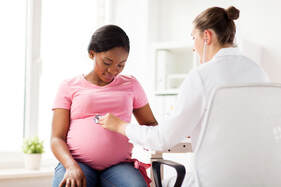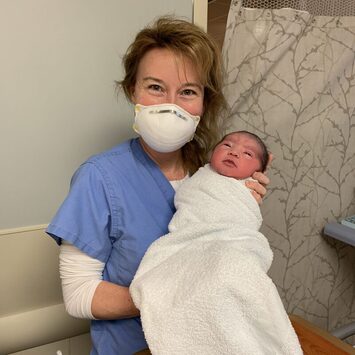 The best OB/GYN in Atlanta: what is a colposcopy? The best OB/GYN in Atlanta may want to perform a colposcopy to monitor any changes in the health of your vagina, cervix, and vulva. The procedure is a lot like a Pap smear and only takes five to ten minutes. The biggest difference is that a special magnifying instrument that is called a colposcope will be used by the doctor. If there have been any abnormal results after having a Pap test, your doctor will use colposcopy to further diagnose any problems. What happens during a colposcopy? Just as you would for a pelvic exam, your doctor will get you to lie down on an exam table. Then the nurse or doctor will put a speculum into your vagina. After opening the speculum, the walls of your vagina will be separated so your doctor can look at your cervix. Using a cleaning solution, they will then wash your cervix making it easier to see any cells that are abnormal. Then, using an instrument called a colposcope, a tool that closely resembles a pair of binoculars with a bright light, the doctor will look at your cervix. The colposcope itself will not touch or go inside you. A biopsy can be performed if the doctor notices something that does not look normal. Meaning that a tiny sample will be taken and sent to a lab. How to prepare You should not be putting anything in the vagina, for example, any creams, before your colposcopy appointment. You should call your doctor to see if you need to reschedule if you are experiencing any heavy vaginal bleeding during your menstrual cycle on the day of your appointment, but a colposcopy can be done at any time during your cycle. You will also need to notify your doctor in advance if you are taking any medications to prevent blood clots, such as warfarin, aspirin, clopidogrel, or heparin. If you have a biopsy during the colposcopy, these medications can increase the bleeding. Although many doctors usually don’t perform a biopsy of the cervix while the patient is pregnant, a colposcopy is safe during pregnancy, you should still let your doctor know if you're pregnant or think that you might be pregnant. What to expect after your procedure You will be ready to go home afterward if your colposcopy ended without any biopsy. But, you might experience some spotting for a day or two. Your recovery, if your doctor performed a biopsy, will depend on whether or not you were given an anesthetic and the type of biopsy that was performed. For a day or two after the biopsy, you may experience some discomfort or pain. You may also need to wear a sanitary pad if you are having any dark discharge or vaginal bleeding. The best OB/GYN in Atlanta and Alpharetta GA The best OB/GYN in Atlanta and Alpharetta GA wants you to call the doctor if you are experiencing symptoms after your procedure such as heavy vaginal bleeding, severe pain in your lower stomach, chills or fever, or a bad-smelling odor. Contact your top Alpharetta and Atlanta OBGYN for your obstetrics and gynecology care.
0 Comments
7/25/2021 0 Comments Women’s OBGYN in Atlanta and Alpharetta GA: the different types of hysterectomy Women’s OBGYN describes the different types of hysterectomy Women’s OBGYN specialists can perform a surgical operation that will remove the uterus, an organ that is located in a woman’s pelvis, this surgery is known as a hysterectomy. A hysterectomy may be performed for different reasons, including:
Only after all other treatments have been attempted with no success will a hysterectomy for any noncancerous reasons will be considered. Types of hysterectomy Your surgeon, depending on your condition, will remove either all or some of your uterus and possibly other parts of your reproductive system. It’s important to clarify if the ovaries and/or cervix is being removed because health care providers will use these terms inexactly, so it is important to have some clarification:
A procedure called oophorectomy may also be done to remove the ovaries or the surgeon may leave them in place. A salpingectomy is done to remove the tubes. Also, a procedure that is called a hysterectomy and bilateral salpingectomy-oophorectomy removes both tubes, both ovaries, and the entire uterus. Important facts to know Your surgeon will have the most flexibility when performing an abdominal hysterectomy. If a woman has any scar tissues from any previous abdominal surgeries, has cancer, is obese, or has a large uterus, an abdominal hysterectomy may be recommended over any other type of hysterectomy. It is also the best choice in any case of an obstetric emergency such as postpartum hemorrhage. This procedure will take one to two hours to perform. What are the risks? There are usually no serious complications or problems from the surgery for most patients who have a hysterectomy. However, it is still a major surgical procedure and does have some risks involved. Including:
Although these are uncommon, the other risks that can happen after a hysterectomy include blood clots, wound infections, hemorrhage, and injuries to the surrounding organs. Women’s OBGYN in Atlanta and Alpharetta GA: what to expect Women’s OBGYN in Atlanta and Alpharetta GA says that most patients will feel their problems have improved after a hysterectomy. Contact your top Alpharetta and Atlanta OBGYN for your obstetrics and gynecology care, Georgia OBGYN.  Top OBGYN explains the details of an endometrial biopsy The top OBGYN says that an endometrial biopsy is a procedure that removes a small piece of tissue from the lining of the uterus called the endometrium. Cell changes due to any abnormal tissues or changes in hormone levels can be shown in the tissue sample. Certain medical conditions can be diagnosed by the doctor after taking a small sample of the endometrial tissue. Uterine infections such as endometriosis can be detected by the biopsy. This procedure can be done without the use of any anesthesia in your doctor’s office. The biopsy can take approximately 10 minutes to complete. Is it painful? Women who are having the procedure done should be notified that the procedure, usually, can be painful. To stop the pain that can be caused by the biopsy you can be given some medication to help. The severe pain from endometriosis can have a psychological impact on women that have the condition. The pain that is caused by endometriosis can be negatively compounded by the inability to conceive. Why is this performed? An endometrial biopsy can be used to rule out diseases and is performed to help diagnose any abnormalities in the uterus. The procedure can be done to:
If you are pregnant, you can not have an endometrial biopsy, and you also should not have one if you have any of these conditions:
What are the risks of the procedure? An endometrial biopsy has very few risks. You may experience cramping or pain, but this quickly goes away after the procedure is over. The other not so common risks are:
What do the results mean? You can expect to have the results back from the lab a week after the procedure. The possible results you might see are:
Afterward, the doctor will go over the results and explain them to you. They will also explain if there are any treatments that need to be done based on what they tell you. You could also receive an inconclusive result. This means that the biopsy could not determine whether you have any cancer cells in the uterus or not. If this happens you might have to have a more involved procedure called a dilation and curettage. The doctor will take a bigger tissue sample from your uterus lining during this procedure to send to a lab for testing. Top OBGYN in Atlanta and Alpharetta GA The top OBGYN in Atlanta and Alpharetta GA says that an endometrial biopsy isn’t always perfect. This is because the doctor may sometimes miss a cancerous or precancerous growth since they take a random tissue sample. Tell your doctor if your symptoms don’t go away. Contact your top Alpharetta and Atlanta OBGYN for your obstetrics and gynecology care, Georgia Obstetrics and Gynecology. 7/18/2021 0 Comments Women’s specialist in Atlanta and Alpharetta GA discusses when to see an OB-GYN Women’s specialist explains when you need to visit your OB-GYN A women’s specialist recommends that females should start visiting their OB-GYN between the ages of 13 and 15. It is important to start these visits before becoming sexually active. Being familiar with an OB-GYN and their services can be a big benefit especially since puberty can be a difficult time. It is also recommended, around the age of 21, that women start having a pelvic exam every year. With these recommendations, there are still times where you might feel something doesn’t feel right about your body. You should never hesitate to call and make an appointment to see your OB-GYN whenever you have any concerns that you feel need to be sorted out. Your OB-GYN will know that you are the one that is the most familiar with your own body and will encourage you to be proactive about your health. It’s time to see your OB-GYN if you feel like something is wrong and you are showing any of these signs. The warning signs to look out forBurning or pain during urination You may be showing signs of a urinary tract infection (UTI) if you are feeling any burning or pain when urinating. Women have a higher risk of developing a UTI than men. You might even have a fever or blood in your urine. Have your OB-GYN check your symptoms and determine how to treat them after finding out what may be causing them. Usually, antibiotics are used as the treatment for UTIs. It’s important to not ignore any symptoms and your OB-GYN will let you know what to expect if you have an infection. If left untreated, a UTI can spread and cause kidney infections or sepsis, this can be a life-threatening condition. Bleeding when it’s not time for your period It is normal for many women to see spotting in between their periods. If you’re taking the Pill, this is a common side effect. But, it’s a good idea to see your OB-GYN if you’re still bleeding heavily or it keeps going for a few days. This can be a symptom of cysts, polyps, pelvic infection, fibroids, or in more rare cases, gynecological cancer. This is usually not a big deal during pregnancy because it is pretty common, but your OB-GYN will want to make sure that it’s not a worst-case scenario, a sign of ectopic pregnancy, or miscarriage. Discharge that smells bad Bad smelling discharge can usually be a sign of an infection. If left untreated, it can most likely become worse. Like we discussed with a UTI, this can also be something that is handled easily with antibiotics, but when not treated, it can increase the risk of HIV. Women’s specialist in Atlanta and Alpharetta GA Our women’s specialist in Atlanta and Alpharetta GA wants you to know that you should never hesitate to call your OB-GYN if you are experiencing anything that may be concerning you. Contact your top Alpharetta and Atlanta OBGYN for your obstetrics and gynecology care.  Best gynecologist explains what you should avoid during pregnancy The best gynecologist office understands that there’s a lot of joy during pregnancy, and there are also many sacrifices. During these nine months, you are going to be responsible for another human being, it’s recommended that expectant moms choose the side of caution to keep their baby and themselves healthy. Don’t worry, this doesn’t mean that you will have to say goodbye to everything that you enjoy when you’re pregnant, but you will still have to make a few changes. Other than the obvious, such as staying away from drugs and alcohol, there aren't many rules about what to do during your pregnancy. You can actually go on with most of your activities. Since the safety and health of your baby are essential, here’s a list of things to avoid during your pregnancy. What to avoid Massage and acupuncture Generally, during pregnancy, some complementary therapy, such as massage and acupuncture, are considered to be safe, but there are still some times when they should be avoided. For example, your belly should not be massaged within the first three months of your pregnancy. When you are pregnant it can also be safe to have acupuncture. You should always look for an acupuncturist that is qualified and who has extensive experience and training with women who are pregnant. Certain points of acupuncture can’t be used safely during pregnancy so be sure to tell your acupuncturist that you are pregnant. Wet paint This recommendation has only been made on the likelihood of toxicity because there is currently no way to measure toxicity from any paint exposure. Exposure, as well as the individual chemicals and solvents, will determine paint toxicity. The safest course of action will always be to limit your exposure to paint fumes, even if it’s assumed that house paint has a lower level of exposure. Cleaning products Always be sure to read the labels of your cleaning products and see if there are any safety warnings for pregnant women. Always follow the safety directions on the label when using cleaning products, household chemicals, and glues. Open the windows and doors to make sure that there’s a lot of ventilation. There is a chemical called naphthalene that can be found in some toilet deodorant cakes and mothballs. When exposed to a very large amount of naphthalene will damage the cells in your blood, leading to hemolytic anemia. Loss of appetite, fatigue, diarrhea, nausea, and vomiting are all symptoms of exposure to large amounts of naphthalene. Newborns are most at risk when exposed to naphthalene. Saunas and hot tubs Relaxing in a hot tub may seem ideal during your pregnancy if you’re feeling aches and pains. However, during the first trimester, an elevated body temperature can lead to birth defects. Try a warm bath instead since a hot tub usually keeps the temperature of the water around 104°F. Best gynecologist in Atlanta and Alpharetta GA The best gynecologist office in Atlanta and Alpharetta GA says to hang in there, you won’t be pregnant forever and all of the activities and foods that have been off-limits will be available to you again soon. Contact your top Alpharetta and Atlanta OBGYN for your obstetrics and gynecology care.  Women’s health specialist advises on how to prepare for a c-section Women’s health specialist says that there are many reasons as to why a c-section, or Caesarean Section, might be the best option for you to meet your baby. After laboring and pushing, sometimes it may be needed. It can be needed due to a medical complication that would not make vaginal birth possible. Many are planned as a personal preference. There is plenty that you can do, regardless of your reasons why you are having one, to plan for the best birth experience for any scenario. Setting the date You may have just a few days or several week's notice to prepare depending on the reason for your scheduled c-section. Your doctor will often set a general frame of time for the birth and you will then work with the appointment scheduler in the office to set a date and time. Some may require you to call the hospital to set the date but many OBGYN offices will make the appointment for you. You will most likely be asked to preregister at the hospital where your baby will be born once the surgical appointment has been made. This may include providing the information that is on your insurance card and your prenatal records. You also may be asked to pre-certify your hospital stay with your insurance provider. This will also be a good time to get an idea about what you can expect after surgery by scheduling a tour of the hospital and learn about their different policies. You may also be asked to have a special consult with either your baby’s doctor or specialist or with your anesthesiologist when you schedule the surgery. These consultations may take place the morning of your procedure or weeks before the surgery depending on the scheduled date of your c-section. Making preparations With a scheduled c-section, many women will opt to craft a birthing plan. A birth plan for your c-section should have things such as who will be there with you during the procedure if videos or photos will be allowed, and preferred type of anesthesia, also plans for when the baby is born, including no pacifiers and who will follow the baby to the nursery. Many women find that having a birth plan, while not necessary, gives them peace of mind and a feeling of some degree of control during a time of uncertainty. While in the hospital, you might also want to make plans for taking care of your home. Most women will require a three-day stay at the hospital following a c-section. If your hospital is far from your home, you may want to enlist some outside help. If you have any pets, you may need to take this time to make arrangements to have someone walk or feed them. Women’s health in Atlanta and Alpharetta GA Women’s health experts in Atlanta and Alpharetta GA also want to remind you will be taken to a recovery room following the birth of your baby. Your pulse, blood pressure, and respiration will be closely monitored. You may also be given oxygen through a tube that will loosely fit into your nostrils. You will be given some time to be acquainted with your newborn. Contact your top Alpharetta and Atlanta OBGYN for your obstetrics and gynecology care.  Top OBGYN: emergency contraception and what you need to know Top OBGYN explains that emergency contraception is contraception that can prevent pregnancy after unprotected sex. Emergency contraception can help you if you believe that your method of birth control may have failed or you didn’t use one and want to prevent pregnancy. Emergency contraception is widely known as the “morning-after pill,” but you don’t have to wait until the morning to take it after unprotected sex. This is not meant to be used for regular birth control. You should speak with your nurse or doctor about regular birth control to help prevent pregnancy. Types of emergency contraception There are currently two forms of emergency contraception: ParaGard intrauterine device (IUD), and pills containing the hormones that prevent pregnancy. ParaGard IUD The insertion of a ParaGard copper IUD is what can be used to act as both emergency contraception and continued birth control for as long as 12 years. Your family planning clinic, gynecologist, or someone at Planned Parenthood can insert the IUD. Many insurance providers cover most or all of the costs, however, it can cost up to $900. The IUD can reduce the chance of pregnancy by up to 99.9% when used correctly as emergency contraception. Plan B/morning after pill There are two different types of pills that you can use for emergency contraception (EC). Levonorgestrel is what is contained in the first pill. Plan Be One-Step, AfterPill, and Take Action are some of the brand names available. You can purchase these over the counter at most pharmacies or drugstores without ID or a prescription. They can be purchase by anyone at any age. They are known to lower the chance of getting pregnant by 75% to 89% when used correctly. The second hormonal pill is called Ella and it is the only brand to make it. This pill contains ulipristal acetate. To get Ella you will need a prescription. You can visit a “minute clinic” to get a prescription from a nurse practitioner if you can’t see your established provider right away. You should give your pharmacy a call to ensure that they have Ella in stock. You can also get Ella online. With an 85% efficacy rate, this pill is considered the most efficient type of pill. When should you take it? You should consider using emergency contraceptives after you have had unprotected sex, or you think your birth control failed, to prevent pregnancy. Emergency contraceptives need to be used as soon as possible after sex to prevent pregnancy and you should never take an emergency contraceptive more than one round at a time. Top OBGYN in Atlanta and Alpharetta GA Top OBGYN in Atlanta and Alpharetta GA says if you still have any questions about emergency contraception you should speak with your doctor. Contact your top Alpharetta and Atlanta OBGYN for your obstetrics and gynecology care.  Women’s OBGYN: the questions you are too embarrassed to ask Women’s OBGYN knows that talking about your private parts is something that you want to keep to yourself. Here are some answers to questions you want to ask but are embarrassed to ask. There are bound to be questions that come up regarding your health over the course of your lifetime. However, many of these issues regarding sexually related parts of your anatomy are considered “taboo” or women are too embarrassed to bring up. This is unfortunate for many reasons, including:
Questions you should never be embarrassed to ask your OBGYN The good news about this is that if there is anyone who is a part of your life that you don’t have to be embarrassed around, it’s your OBGYN. They look forward to putting your mind at ease and finding solutions to your questions, don’t be afraid, they have heard it all. Here are some questions that you should never be embarrassed to ask.
Women’s OBGYN in Atlanta and Alpharetta GA Women’s OBGYN suggests that even if you have to look away or cover your face with your hands as you ask the question, never be afraid to ask your OBGYN any questions. Contact your top Alpharetta and Atlanta OBGYN for your obstetrics and gynecology care.  Women’s health in Atlanta and Alpharetta GA: how does your diet affect your menopause? Women’s health experts say that following a menopause diet plan will help you avoid drinks and food that might worsen symptoms and will have negative effects on hormones. A properly considered menopause diet will also help with weight loss and make you feel healthier and more active. What changes happen during menopause? Your estrogen hormone will begin to decline during the transition to menopause, disrupting your normal cycle patterns of progesterone and estrogen. Declining levels of estrogen will negatively impact your metabolism and potentially lead to weight gain. How your body digests carbs and your cholesterol levels might be affected by these changes. Difficulty sleeping and hot flashes are symptoms that many women experience during this period. Also, these changes to your hormones can lead to a bone density decline, which can increase your risk of bone fractures. Fortunately, to relieve symptoms of menopause, you can make changes to your diet. Foods to eat Evidence has shown that certain foods may help some symptoms of menopause, such as poor sleep, hot flashes, and low bone density. Dairy products An increased risk of fractures can be the result of declining estrogen levels during menopause. Dairy Products such as yogurt, cheese, and milk contain calcium, potassium, magnesium, and vitamin K and D, all of which are essential for bone health. Also, there has been some evidence that has linked the consumption of dairy to a decreased risk of premature menopause. Healthy fats Women going through menopause may benefit from healthy fats such as omega-3 fatty acids. A review study concluded that omega-3 supplements can decrease the severity of night sweats and the frequency of hot flashes. So, it may be worth testing to see if you can increase your omega-3 to improve your symptoms related to menopause. Whole grains A diet high in whole grains has been linked to a reduced risk of heart disease, premature death, and cancer. Whole grains are high in nutrients, including B vitamins and fiber. A study has shown that postmenopausal women eating 4.7 grams of whole-grain fiber reduced the risk of early death by 17%. Fruits and vegetables Packed with vitamins and minerals, fiber and antioxidants American dietary guidelines recommend filling half of your plate with fruits and vegetables. In a one-year study of menopausal women, those who ate more fruits and vegetables experienced a 19% reduction in hot flashes. Foods to avoid You can also reduce some of the symptoms linked to menopause, such as weight gain, how flashes, and poor sleep but avoiding certain foods. Processed carbs and added sugars A higher rate of hot flashes has been linked with high blood sugar, metabolic syndrome, and insulin resistance. Limiting your intake of processed foods and added sugars, such as baked goods, crackers, and white bread may help reduce hot flashes. Caffeine and alcohol Caffeine and alcohol can trigger hot flashes, according to studies. In a study of 196 menopausal women, alcohol and caffeine intake increased hot flashes severity but not the frequency. Women’s health in Atlanta and Alpharetta GA The women’s health experts suggest speaking with your OBGYN and learn how you can treat the symptoms of menopause. Contact your top Alpharetta and Atlanta OBGYN for your obstetrics and gynecology care. |
AuthorWrite something about yourself. No need to be fancy, just an overview. Archives
November 2021
CategoriesAll Alpharetta GA Atlanta GA Atlanta Women OBGYN Atlanta Women's OBGYN Best Gynecologist Best OB/GYN In Atlanta Gynecologist Gynecologists And Obstetricians Gynecology And Obstetrics OBGYN OBGYN Near Northside Hospital OBGYNs Near Northside Hospital Obstetrician Obstetricians Prenatal Care Gynecology Top Gynecologist Top OBGYN Top OBGYN Atlanta Top Obstetrician In Atlanta Women's Clinic Women's Health Women’s Health Women’s Health Women's OBGYN Women’s OBGYN Women’s OBGYN Women’s Obstetrics And Gynecology Women’s Obstetrics And Gynecology Women Specialists Women's Specialist Women’s Specialist Women’s Specialist Women's Specialists |
 RSS Feed
RSS Feed
